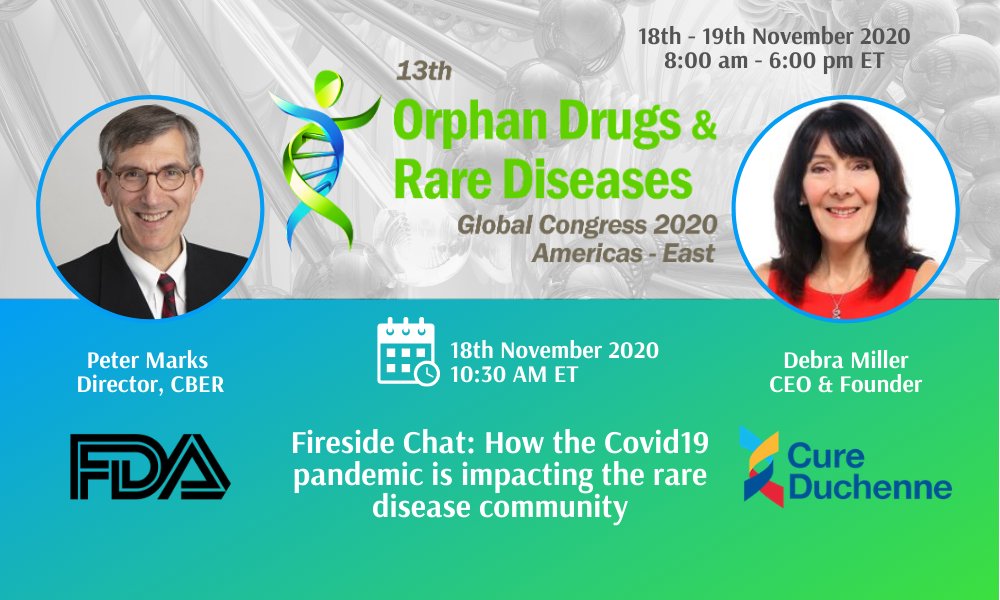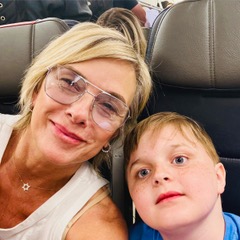Fireside Chat at the 13th Orphan Drugs and Rare Diseases Global Congress – Americas 2020

Debra Miller, Founder and CEO of CureDuchenne, and Dr. Peter Marks, Director of the Center for Biological Evaluation and Research of the FDA, were featured at a Fireside Chat at the 13th Orphan Drugs and Rare Diseases Global Congress – Americas 2020 on November 18, 2020. The topic of discussion was the impact of COVID-19 on the rare disease community.
Event Summary
A lively discussion began with Dr. Marks expressing that one of the challenges COVID has presented to him was that progress on building new frameworks to treat rare diseases was interrupted. He expects that they’ll be able to get back on track now that progress has been made on COVID-19 vaccines and treatments, although it may be “a bumpy ride over the next few months.”
Speaking about Duchenne on the behalf of the rare disease community, Debra noted that “when you have an abbreviated life span, taking a year out of a person’s life is tragic” and that people with rare diseases have been and continue to be in a state of emergency, drawing parallels between the nation’s ability to respond to COVID and what ought to be done for rare diseases. While there is still a long way to go, there are treatments in clinical trials that look promising, and patients whose lives are at stake will miss the opportunity as a result of long study protocols that may not be necessary when treatments are showing clear improvement. She asked Dr. Marks whether pharmaceutical and biotech companies should be submitting more aggressive trial designs in certain situations. Dr. Marks succinctly explained that when a treatment is aiming to stop the progression of a disease, it may not be so apparent that the treatment is effective and so in those situations, the more traditional clinical trial design with placebo controls is likely applicable. But in situations where the treatment is aiming to markedly improve a disease, it may not be necessary because of a very apparent clinical difference. Showing his understanding of the patient perspective, Dr. Marks said “The patient-focused way of saying that is ‘I may not be here two years from now, so can’t I get therapy now…?’…We need to strike a balance there because we are going to need randomized data when the clinical difference is small, but sometimes we don’t because it’s so apparent.”
Ever optimistic, Dr. Marks also expressed the need for new paradigms that could put multiple gene therapies through the same vector so that vector manufacturing can be leveraged. There is also room for developing Bayesian trial designs in which each individual patient’s data builds on the one before so that what is learned from only a few trial participants is maximized. In rare diseases, sometimes the populations are so small that it becomes very important to learn the maximum information from a very small number of people. Debra also stated the need to study immune modulation alongside gene therapies, sooner vs. later, so that it is more likely that patients who are older who may have been exposed to antibodies may be able to benefit from gene therapy treatments.
The COVID-19 vaccine was discussed offering insight into how the rare disease community should consider getting vaccinated. The messenger RNA vaccines are not live virus products. They work by instigating the body to make antibodies to proteins that are introduced through the vaccine. The safety evaluations that have been conducted thus far on more than 30,000 clinical trial participants for the two vaccines will continue into the future and they will continue to study efficacy in different population subsets. Both panelists agreed that there is enough disruption to rare disease patients’ ability to get care so it’s important to get them vaccinated ASAP so they can go back to getting their care. Of course, everyone should discuss getting the vaccine with their trusted providers to ensure the right clinical decision for every situation. The Advisory Committee on Immunization Practices is responsible for making the decision on early distribution.,
To close the panel, Debra asked what patient advocacy groups can do to help accelerate access to both gene therapies and vaccines and Dr. Mark’s response was very encouraging: “Keep doing what you’re doing. It’s good for you to ask the hard questions – that’s what needs to happen – need to keep the pressure on to keep moving things along,” and the FDA can certainly count on the rare disease community to do that.




